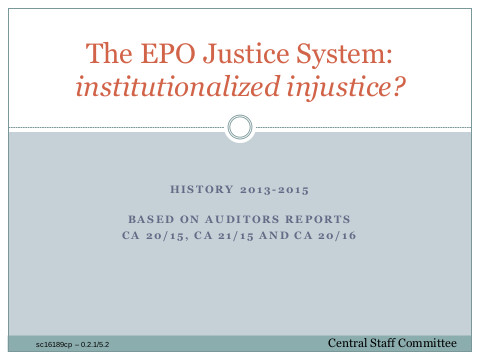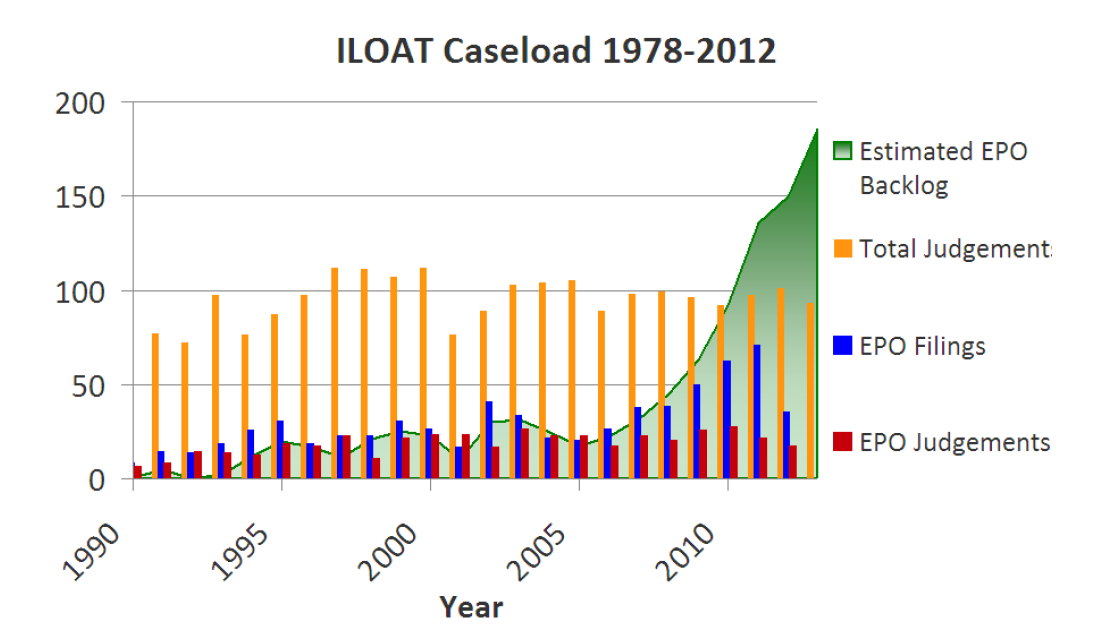

Publications by the EPO Staff Committee [PDF] criticising deficiencies in the internal dispute settlement system were censored by Team Battistelli in 2016.
The main focus of the present series is the EPO "Strike Regulations" which were proposed by the EPO President Benoît Battistelli and adopted with the "unanimous" approval of the organisation's Administrative Council in June 2013.
"As we shall see in due course, one of the most noteworthy aspects of this affair is the bizarre and incongruous role played by a former judge of the European Court of Human Rights, Sir Paul Mahoney."The fact that the vast majority of Council delegates had no reservations about blindly rubber-stamping these manifestly deficient regulations is in itself an outrageous affront to the staff of the EPO.
But what is equally, if not more, outrageous is the fact that, following Battistelli's departure at the end of June 2018, the regulations were maintained in force for another three years under the reign of his successor António Campinos until they were finally struck down by the ILOAT on 7 July 2021.
However, Campinos had a perfect excuse for upholding the regulations which had been introduced by his predecessor.
This is because, in May 2019, the EPO's internal appeals committee issued an opinion which purported to give the disputed "Strike Regulations" a clean bill of legal health.
"As is well known, the shenanigans at the EPO during the Battistelli era caused a massive explosion in litigation, which has in turn led to a huge backlog of cases at the ILOAT, thereby causing severe delays for litigants."As we shall see in due course, one of the most noteworthy aspects of this affair is the bizarre and incongruous role played by a former judge of the European Court of Human Rights, Sir Paul Mahoney.
But before coming to that particular detail, we will begin by taking a look at the EPO's "internal dispute settlement procedure", which provides a textbook example of a dysfunctional justice system at an international organisation.
As is well known, the shenanigans at the EPO during the Battistelli era caused a massive explosion in litigation, which has in turn led to a huge backlog of cases at the ILOAT, thereby causing severe delays for litigants.

The shenanigans at the EPO during the "Battistelli era" caused a massive explosion in litigation which in turn led to a huge backlog of cases at the ILOAT, causing severe delays for litigants. The problem was aggravated by dysfunctional nature of the EPO's internal appeals committee.
"Indeed, it is no exaggeration to say that under Battistelli the EPO's internal appeal system was reduced to a joke."Faced with this situation, Battistelli ordered the internal appeals committee to continue processing appeals without the two members who should ordinarily have been appointed by the Staff Committee.
Subsequently, Battistelli called for staff "volunteers" to fill the vacant positions and proceeded to appoint these hand-picked "volunteers" in place of the missing Staff Committee members.
In Judgment No. 3694 [PDF] delivered in July 2016 (local copy [PDF]), the ILOAT found that the composition of the internal appeals committee without staff members was irregular, because the committee thus composed lacked "a fundamental guarantee of its impartiality".
In Judgment No. 3785 [PDF] delivered in November 2016 (local copy [PDF]), the ILOAT likewise found that the composition of the internal appeals committee with "volunteers" appointed by the President was irregular because it was not in accordance with the applicable rules which required those members to be appointed by the EPO Staff Committee.
These ILOAT Judgments effectively invalidated all decisions of the EPO's internal appeals committee taken between October 2014 and November 2016. This resulted in a huge number of cases being remitted back from the ILOAT to the EPO for renewed treatment by the internal appeals committee.
"These ILOAT Judgments effectively invalidated all decisions of the EPO's internal appeals committee taken between October 2014 and November 2016."This legal ping-pong between the Tribunal and the EPO aggravated the already intolerable delays that litigants were forced to suffer.
It is small wonder that the EPO Staff Committee described the situation as "institutionalised injustice" in a report issued in 2016. This report which exposed serious deficiencies in the EPO's internal justice system was censored by the Principal Director of Human Resources, Elodie Bergot, who personally vetoed its publication on the EPO intranet.
The dysfunctionality of the EPO's internal justice system under Battistelli was an unmitigated disaster for staff, but there appears to have been one fortunate beneficiary of this fiasco.
"The dysfunctionality of the EPO's internal justice system under Battistelli was an unmitigated disaster for staff, but there appears to have been one fortunate beneficiary of this fiasco."Karoline Kerber-Zubrzycka, a law graduate from the University of Passau, joined the EPO's legal department as a lawyer in October 2003. In April 2013 she received the dubious distinction of being selected by Battistelli to chair the internal appeals committee, a position which she held without interruption until December 2017.

Karoline Kerber-Zubrzycka chaired the EPO's dysfunctional internal appeals committee between April 2013 and December 2017. After a brief interlude on the Administrative Tribunal of the CTA, she was appointed as a legally-qualified member of the EPO's Boards of Appeal by the Administrative Council in September 2021.
"She returned to her old stomping-ground at the EPO in September 2021 when she was appointed as a "legally qualified member" of the Boards of Appeal, the EPO's legal fudge factory currently located in Haar."The CTA is a joint organisation of the African, Caribbean and Pacific (ACP) Group of States and the European Union (EU). It operates under the framework of the Cotonou Agreement and is funded by the EU.
The CTA used to be under the jurisdiction of the ILOAT. However, after the ILOAT delivered a number of judgments against the CTA in 2015 and dismissed the organisation's requests for a review of these judgments, the CTA withdrew from the Tribunal's jurisdiction and proceeded to set up its own internal "Administrative Tribunal" in 2018.
Kerber-Zubrzycka sat on the CTA's Administrative Tribunal between November 2018 and June 2021. According to her curriculum vitae, she moved to the OECD in August 2021 where she was appointed Deputy Chair of the "Joint Advisory Board" (JAB). The JAB is the OECD's equivalent of an internal appeals committee.
"In the next part we shall examine the role played by a former judge of the European Court of Human Rights in this sorry saga of "institutionalised injustice"."She returned to her old stomping-ground at the EPO in September 2021 when she was appointed as a "legally qualified member" of the Boards of Appeal, the EPO's legal fudge factory currently located in Haar.
It's not clear whether Kerber-Zubrzycka still holds onto her position at the OECD following her subsequent appointment to the EPO's Boards of Appeal but her entry on LinkedIn suggests that both appointments are currently active.
In the next part we shall examine the role played by a former judge of the European Court of Human Rights in this sorry saga of "institutionalised injustice". ⬆